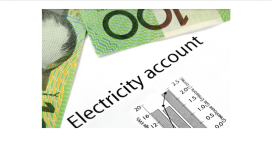Consumer Watchdog to Investigate Claims of Anti-Competitive Conduct by Energy Companies

Australian residences are falling below the World Health Organisation’s safe temperature guidelines with a new survey suggesting that many homes aren’t reaching the recommended 18C degrees in winter, for about 70 percent of the time.
The survey results have been released at the same time the Australian Competition and Consumer Commission (ACCC) launches an investigation into power company profits, amid power shortages across New South Wales in recent weeks, during some of the coldest, wettest weather we’ve experienced all year.
ACCC to investigate
Many believe that power companies have been allowed to ‘run amok’ for too long, increasing prices without warning without sufficient justification.
Complicated jargon and a complex market structure mean that many consumers don’t understand how their power is generated and supplied and therefore simply end up bamboozled, not informed enough to know when they could be taken advantage of.
The Australian Competition and Consumer Commission (ACCC) will be looking into price increases applied by power companies in the coming weeks, to ensure that they are charging consumers fairly and not ‘price gounging’ or engaging in anti-competitive behaviour which they are unjustifiably attributing to world events such as Russia’s invasion of Ukraine.
Anti-competitive conduct
Anti-competitive conduct, also known as price-fixing or engaging in a cartel, exists when two or more businesses illegally agree to work together, instead of competing, enabling them to control and restrict how a market operates, which in turn drives up prices for consumers and profit margins for the companies, while maintaining the illusion of competition.
In Australia, the penalties for such conduct can amount to millions of dollars in fines for corporations, and even the potential of imprisonment for those proven beyond a reasonable doubt to be directly responsible.
For example in August 2019, the Federal Court of Australia fined Japanese shipping company Kawasaki Kisen Kaisha Ltd – also known as K-Line – $34.5 million over cartel conduct, after the company admitted to engaging in anti-competitive conduct with other shipping companies between July 2009 and September 2012.
The ACCC is also investigating whether rules were broken when generators across the grid recently withdrew electricity supply, sparking blackouts in a number of areas, and warnings of more to come.
Claims of corresponding decrease in supply
Many power companies claimed they engaged in this action because the high cost of coal and gas made it impossible to operate profitably.
While Russia’s war with the Ukraine is being blamed for soaring fuel costs, climate change which successive governments have continued to ignore, is also a factor to take into consideration.
Climate change, according to the scientists, also means that temperatures are spiking and falling in unprecedented ways – something that is only likely to continue along with extreme weather events.
And on cold days when everyone cranks up the heaters and the air conditioning, the demand soars even higher, especially during peak periods – such as late afternoons and evenings.
A long time coming…
The other issue of course is that Australia has not embraced renewable energy, which it is in a good position to do.
Previous Prime Minister Scott Morrison is famous for wielding a lump of coal in Parliament, refusing to seriously invest in the transition to renewables, and ignoring the ongoing issues with the ‘old’ energy generation and supply system, which is not just environmentally damaging, but is reliant on infrastructure which is outdated, inefficient, unreliable and costly.
Unfortunately, for now, that means that as the current energy crisis continues, the quickest and easiest solution to keeping the lights and the heaters on in homes and workplaces is to use coal.
Yet again, we’re in a position of providing band aid solutions instead of preparing longer-term strategies because our governments have a tendency not to think beyond election cycles, and have no real accountability in terms of the decisions they make, no matter how enduring they may be.
The powers of the ACCC
The ACCC intends to report to the Federal Government next month, although as we have seen previously, governments can be slow to act on issues of this nature.
The ACCC does have the authority to take energy retailers to court if they mislead consumers – or engage in ‘unconscionable conduct’.
The ACCC also has the power to compel individuals and companies to provide information regarding any suspect behaviour, it can seek warrants from a magistrate, which can be executed at a company’s premises, and it can notify the Australian Federal Police to step in.
However, these too, can be lengthy processes and do nothing to solve the immediate issue for Australians trying to heat their homes in the winter months only to face limited electricity supply, or those Australians who live in energy poverty.
Energy poverty
It’s estimated that about 3 percent of Australians live in energy poverty – meaning they can’t afford the heat or cool their homes or keep the lights on for extended periods of time.
Many of these are aged pensioners, or those people on Centrelink benefits like JobStart, (formerly Newstart) which are grossly inadequate to cover the basic costs of living in many cases.
Living in cold conditions poses health risks for people with respiratory conditions, such as asthma attacks or symptoms, worsening of chronic obstructive pulmonary disease (COPD), and infection.
Cold temperatures can also contribute to poor mental health, which we know is already on the rise as the result of numerous natural disasters and the pandemic.
In 2019, the COAG Energy Council agreed minimum energy efficiency standards for all rental properties by 2030, but only Victoria and the ACT have taken any steps towards this goal.
Landlords have come under fire too, for ignoring the requirements of tennants to have homes that are properly insulated so that temperatures inside remain more consistent.
Minister given new range of powers to intervene
New South Wales Energy Minister Matt Kean has been given extraordinary powers to be able to force coal companies to supply power generators with fuel however this doesn’t mean that the crisis is over yet and New South Wales residents can expect to be asked to ‘save power’ or endure blackouts for some time to come.







